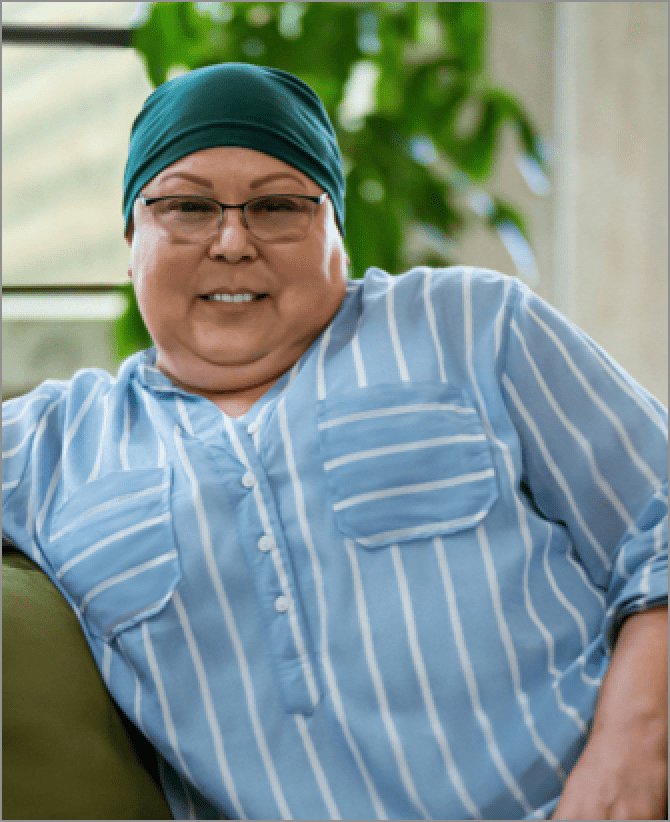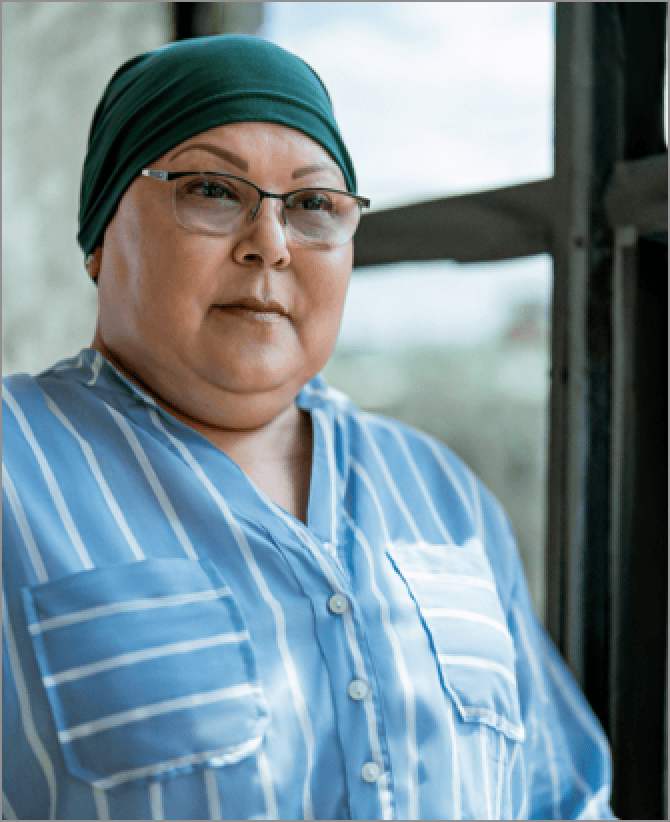Real patient stories with TRODELVY














Ambassadors featured are compensated by Gilead.
This page features the experiences of people being treated with TRODELVY at the time of the interview. These experiences may have changed since, and your experience may be different.
TRODELVY® (sacituzumab govitecan-hziy) is a prescription medicine used to treat adults with:
It is not known if TRODELVY is safe and effective in people with moderate or severe liver problems or in children.
Talk to your healthcare provider to see if TRODELVY may be a treatment option for you.
For more information on how TRODELVY is given, please visit the Dosing Information page.
<TEXT ON-SCREEN>
TRODELVY®
sacituzumab govitecan-hziy
180 mg for injection
Frequently asked questions about TRODELVY
Hear Ambassador answers following some important information about TRODELVY.
Please see link provided for Important Facts, including Important Warning.
<END OF TEXT ON-SCREEN>
[Gentle music plays]
Narrator:
TRODELVY is for adults with: HR-positive, HER2-negative metastatic breast cancer who have received hormone therapy and at least two additional treatments for metastatic disease. Metastatic triple-negative breast cancer who have received two or more prior treatments, including at least one for metastatic disease.
<TEXT ON-SCREEN>
TRODELVY®
sacituzumab govitecan-hziy
180 mg for injection
TRODELVY is for adults with:
Metastatic = cancer that has spread to other parts of the body, HER2- = human epidermal growth factor receptor 2-negative, HR+ = hormone receptor-positive
<END OF TEXT ON-SCREEN>
Narrator:
TRODELVY can cause severe or life-threatening side effects, including low white blood cell count which can lead to infections, diarrhea, and allergic reactions. Please continue watching for Important Safety Information toward the end of this video and please see link provided for Important Facts, including Important Warning.
<TEXT ON-SCREEN>
TRODELVY®
sacituzumab govitecan-hziy
180 mg for injection
TRODELVY can cause serious side effects, including low white blood cell count and diarrhea:
Diarrhea is common, and can be severe which can cause dehydration and kidney problems. Your healthcare provider should monitor you for diarrhea and give you medicine to help control it. If you become too dehydrated, they may need to give you fluids and electrolytes. If diarrhea develops during TRODELVY treatment, your provider should check if it may be caused by an infection. They may reduce your dose, delay treatment, or permanently stop TRODELVY if the diarrhea is severe and can't be controlled with anti-diarrheal medicine. Call your healthcare provider right away the first time that you get diarrhea during treatment with TRODELVY; if you have black or bloody stools; if you feel lightheaded, dizzy or faint; if you're unable to drink fluids due to nausea or vomiting; or if you can't get your diarrhea under control in 24 hours.
Please continue watching for Important Safety Information toward the end of this video.
Ambassadors featured are compensated by Gilead. This video features people being treated with TRODELVY at the time of the interview. These experiences may have changed since, and your experience may be different.
<END OF TEXT ON-SCREEN>
Jacquie:
TRODELVY is an antibody-drug conjugate, or ADC. Did your healthcare team explain this class of medication to you? If so, how did they explain it?
<TEXT ON-SCREEN>
Jana
Patient Ambassador
Jacquie
Patient Ambassador
An ADC is a substance that binds to a specific protein or receptor found on certain cells.
<END OF TEXT ON-SCREEN>
Jana:
She explained to me how it was different from other treatments, which I found so exciting, to be a part of that.
<TEXT ON-SCREEN>
TRODELVY is designed differently than traditional chemo.
<END OF TEXT ON-SCREEN>
Jacquie:
100%, when I heard that it was a whole different process and the delivery mechanism was so different, I was actually excited about that. Very much so.
<TEXT ON-SCREEN>
Katherine
Patient Ambassador
Kevin
Katherine’s husband
<END OF TEXT ON-SCREEN>
Kevin:
What do you think is the most important thing for people to know about how TRODELVY works?
<TEXT ON-SCREEN>
Information from laboratory studies suggests that this is how TRODELVY works. The clinical benefit of these observations is unknown.
<END OF TEXT ON-SCREEN>
Katherine:
It targets a specific protein and the antibody, like, wears this drug. I’m imagining that it’s wearing like this little backpack, goes to the cancer cell, and then it sets off its backpack of drug to kill that cell. That’s how I envision it. Um, I’m sure he used more science-y words.
<TEXT ON-SCREEN>
TRODELVY is designed to bind to cells with Trop-2 and deliver medicine. Trop-2 is a specific protein found on certain types of cells, including cancer cells. Tumor cells in certain cancers have a higher amount of Trop-2 than normal, noncancer cells. Information from laboratory studies suggests that this is how TRODELVY works. The clinical benefit of these observations is unknown.
<END OF TEXT ON-SCREEN>
Lisa:
How did you and your healthcare team develop a plan for potential side effects?
<TEXT ON-SCREEN>
Tiana
Patient Ambassador
Lisa
Patient Ambassador
<END OF TEXT ON-SCREEN>
Tiana:
Kind of do trial and error. If one thing isn’t working, we move on to the next thing. They do listen, and they do take it seriously.
Tanya:
The nurses actually were the ones that see firsthand what a patient goes through. The nurses really are the ones that really talk to you about what to expect.
<TEXT ON-SCREEN>
Tanya
Patient Ambassador
<END OF TEXT ON-SCREEN>
Katherine:
Karen, what advice would you give about side effects to someone starting treatment with TRODELVY?
Karen:
Don’t be afraid. Educate yourself about side effects. Know that just because they’re possible doesn’t mean it’s definitely going to be your experience.
<TEXT ON-SCREEN>
Karen
Patient Ambassador
<END OF TEXT ON-SCREEN>
Jana:
You will most likely have a few. They could be severe, or they could not be. But whatever they are, your oncologist will help you to manage them.
Lisa:
Just be prepared with what’s going to help you get through it. Always, always be prepared with the medications.
<TEXT ON-SCREEN>
Discuss any side effects you experience with your healthcare team, who can help guide you.
<END OF TEXT ON-SCREEN>
Jacquie:
It’s super, super, super important. That you have to be prepared, you have to understand what’s coming your way, and you have to also be prepared to potentially combat those side effects as they arise. So you’re not caught, you know, thinking, “Oh my gosh, what am I going to do?”
<TEXT ON-SCREEN>
Marc
Jacquie’s husband
Jacquie
Patient Ambassador
<END OF TEXT ON-SCREEN>
Christa:
What resources or routines have you found helpful?
Tanya:
My local cancer center. One of my good friends just organized a breast cancer support group that meets once a month.
<TEXT ON-SCREEN>
Christa
Tanya’s cousin
Tanya
Patient Ambassador
<END OF TEXT ON-SCREEN>
Jana:
In talking with other people, going through what you’re going through and their side effects, their, uh, things that happen to them with the treatment is very similar. Of course, we all have a little bit of differences, but it is so encouraging on some of these small issues even for somebody to say, “Oh yeah, I’m going through that.”
Lisa:
I did get a lot of literature. So I’ve read up on it enough for me to be satisfied.
Katherine:
Definitely the social media groups that I’m part of. Um, I love to find out how things are going for other women just to compare to my experience.
Marc:
I like our routine. You know, I take Jacquie to the infusion center and uh, we’re surrounded by just wonderful nurses. Uh, and you know, I hang out with Jacquie the whole time, bring my laptop. And if she dozes off, I put it in an earbud or whatever and listen to whatever I got to listen to and we, you know, so we hang out and we talk.
<TEXT ON-SCREEN>
TRODELVY is given as an IV infusion on days 1 and 8 of a 3 week (21-day) cycle.
Your healthcare provider will decide how long you stay on treatment.
<END OF TEXT ON-SCREEN>
Lisa:
What is your true experience with the drug TRODELVY overall?
Tiana:
Challenging but grateful at the same time. I appreciate that I have a drug that is working for me.
Katherine:
How has learning about other people’s experience with TRODELVY made an impact on you?
Karen:
Oh, it’s given me hope. It’s kept me on this path and every day I have the opportunity to make a difference and give that hope to somebody else.
[Gentle music plays]
[Voiceover with text on-screen]
WHAT IS TRODELVY?
TRODELVY® (sacituzumab govitecan-hziy) is a prescription medicine used to treat adults with:
It is not known if TRODELVY is safe and effective in people with moderate or severe liver problems or in children.
IMPORTANT SAFETY INFORMATION
TRODELVY can cause serious side effects, including low white blood cell count and diarrhea:
Do not receive TRODELVY if you have had a severe allergic reaction to TRODELVY. Ask your healthcare provider if you are not sure.
Allergic and infusion-related reactions can be serious and life-threatening. Tell your healthcare provider or nurse right away if you get any of the following symptoms during your infusion of TRODELVY or within 24 hours after: swelling of your face, lips, tongue, or throat; hives; skin rash, itching, or flushing of your skin; fever; difficulty breathing or wheezing; lightheadedness, dizziness, feeling faint, or pass out; or chills or shaking chills (rigors).
Nausea and vomiting are common and can sometimes be severe. Before each dose of TRODELVY, you will receive medicines to help prevent nausea and vomiting along with medicines to take home with instructions about how to take them. Call your healthcare provider right away if you have nausea or vomiting that is not controlled with the medicines prescribed for you. Your healthcare provider may decide to decrease your dose, delay treatment, or permanently stop TRODELVY if your nausea and vomiting is severe and cannot be controlled with anti-nausea medicines.
Before receiving TRODELVY, tell your healthcare provider about all of your medical conditions, including if you:
Tell your healthcare provider about all the medicines you take, including prescription and over-the-counter medicines, vitamins, and herbal supplements. Certain medicines may affect the way TRODELVY works.
The most common side effects of TRODELVY include decreased white blood cell (leukocyte and lymphocyte) and red blood cell counts, feeling tired or weak, hair loss, constipation, increased sugar levels in the blood, decreased protein levels (albumin) in the blood, decreased appetite, changes in kidney function test, increased levels of enzyme called alkaline phosphatase in the blood (test for liver or bone problems), and decreased levels of magnesium, potassium, and sodium in the blood.
These are not all of the possible side effects of TRODELVY. Call your doctor for medical advice about side effects. You are encouraged to report negative side effects of prescription drugs to the FDA. Visit www.fda.gov/medwatch, or call 1-800-FDA-1088.
Please see Important Facts, including Important Warning on TRODELVY.com.
<END OF VOICEOVER AND TEXT ON-SCREEN>
<TEXT ON-SCREEN>
TRODELVY®
sacituzumab govitecan-hziy
180 mg for injection
GILEAD
TRODELVY, the TRODELVY logo, GILEAD, and the GILEAD logo are trademarks of Gilead Sciences, Inc., or its related companies. All other marks are the property of their respective owners.
© 2025 Gilead Sciences, Inc. All rights reserved. US-TROC-0699 06/25
<END OF TEXT ON-SCREEN>

My healthcare provider gave me information on TRODELVY. She said it would be a good option for me at the time when she started me on it.
LisaLiving with mTNBC

Before my treatment, I try to drink as much fluid as I can. I also start taking my anti-nausea medication my healthcare team prescribed. I make sure I’m eating healthy foods. Before my treatment, I put some cream on my port to make it more comfortable.
TanyaLiving with mTNBC
<TEXT ON-SCREEN>
TRODELVY®
sacituzumab govitecan-hziy
180 mg for injection
We asked our Patient Ambassadors about their treatment days with TRODELVY.
Hear their responses following some important information about TRODELVY.
Please see link provided for Important Facts, including Important Warning.
<END OF TEXT ON-SCREEN>
[Gentle music plays]
Narrator:
TRODELVY is for adults with: HR-positive, HER2-negative metastatic breast cancer who have received hormone therapy and at least two additional treatments for metastatic disease. Metastatic triple-negative breast cancer who have received two or more prior treatments, including at least one for metastatic disease.
<TEXT ON-SCREEN>
TRODELVY®
sacituzumab govitecan-hziy
180 mg for injection
TRODELVY is for adults with:
Metastatic = cancer that has spread to other parts of the body, HER2- = human epidermal growth factor receptor 2-negative, HR+ = hormone receptor-positive
<END OF TEXT ON-SCREEN>
Narrator:
TRODELVY can cause severe or life-threatening side effects, including low white blood cell count which can lead to infections, diarrhea, and allergic reactions. Please continue watching for Important Safety Information toward the end of this video and please see link provided for Important Facts, including Important Warning.
<TEXT ON-SCREEN>
TRODELVY®
sacituzumab govitecan-hziy
180 mg for injection
TRODELVY can cause serious side effects, including low white blood cell count and diarrhea:
Please continue watching for Important Safety Information toward the end of this video.
Ambassadors featured are compensated by Gilead. This video features people being treated with TRODELVY at the time of the interview. These experiences may have changed since, and your experience may be different.
<END OF TEXT ON-SCREEN>
Katherine:
Hi Karen!
Karen:
Hi!
Katherine:
It’s so good to see you! I’m glad we get to do this together.
Karen:
I know. Katherine and Karen.
Katherine:
That’s right!
<TEXT ON-SCREEN>
Karen
Patient Ambassador
Katherine
Patient Ambassador
<END OF TEXT ON-SCREEN>
Karen:
What does an infusion day look like for you?
Katherine:
I start getting, um prepped with my anti-nausea medication, I put the cream on my port, and then my friend and I will head to the cancer center. Everybody knows you by name at this point. Um, they, you know, the great nurses and, um, the medical assistants, they call you back. So we start the pre-meds, they do the lab work, they access my port, which is actually the hardest part for me.
<TEXT ON-SCREEN>
TRODELVY is given as an IV infusion on days 1 and 8 of a 3 week (21-day) cycle.
Before each dose, you will receive medicines to help prevent infusion-related reactions, and nausea and vomiting.
<END OF TEXT ON-SCREEN>
Katherine:
And then, uh, when it’s time for TRODELVY, I have two nurses who come in, and they hang the TRODELVY. Um, and so I just basically visit with my friend, whoever’s come. Sometimes I get sleepy, and I’ll rest…
<TEXT ON-SCREEN>
You will receive the first dose over 3 hours; if well-tolerated, future doses may be given over 1-2 hours.
You will be monitored for side effects during and for at least 30 minutes after receiving TRODELVY.
<END OF TEXT ON-SCREEN>
Katherine:
…and it’ll wrap up around lunchtime. And then I head home, and usually I sleep most of the day. Um, and yeah, that’s my day with TRODELVY.
<TEXT ON-SCREEN>
Your healthcare provider may slow or pause your treatment if you have an infusion-related reaction, or permanently stop TRODELVY if you have a life-threatening infusion-related reaction.
<END OF TEXT ON-SCREEN>
Karen:
Does your, the person that accompanies you, you stay with you for the treatment?
Katherine:
Yes, yes, they’re there the whole time and then they’ll take me home as well. It’s actually gotten to the point where people are kind of fighting over the slots.
Karen:
Oh, that’s great.
Katherine:
Yeah, I feel really loved, um, really loved and supported.
<TEXT ON-SCREEN>
Your healthcare provider will decide how long you stay on treatment.
<END OF TEXT ON-SCREEN>
Jana:
What I have found I like to do, because I’m a bit of a talker. So in between blood work and infusion, I walk around the room. I see who looks like they might need an encouraging hand. I ask them if they want to talk. If they want to share. Because I don’t want to be intrusive. And so I will visit with other people. And that helps me. It really does.
<TEXT ON-SCREEN>
Jana
Patient Ambassador
Jacquie
Patient Ambassador
<END OF TEXT ON-SCREEN>
Jacquie:
Does anyone say, beat it lady? Get out of here.
Jana:
They probably though they didn’t say it out loud.
Tanya:
So you go in and they give you pre-meds and then you have your infusion, which is an hour. Mine is an hour. And it’s boring because you’re just sitting there and you’re just watching the, you know, the stuff drip through.
<TEXT ON-SCREEN>
Christa
Tanya’s cousin
Tanya
Patient Ambassador
<END OF TEXT ON-SCREEN>
Karen:
I’m pretty independent, so I go by myself and I’m able to. Though that, that, I’m really grateful that I can do that.
Katherine:
I found that I emotionally struggle with it if I go alone. Um, it affects my emotions, so to have someone there who’s distracting me, who’s telling me stories, helps me a lot. So, but I really admire that you’re able to go alone.
Marc:
You do things that are fun and funny. Like when we go to treatment. And the duck business. I mean, where did that come from?
<TEXT ON-SCREEN>
Marc
Jacquie’s husband
<END OF TEXT ON-SCREEN>
Jacquie:
Well, okay. So, going to treatment was becoming a little heavy. And I just said to myself, I don’t want to go. And I thought to myself, okay, you need to switch this up right now. So I said, what am I going to do? So I have these little ducklings. And so we would go to the infusion center and I started hiding them all around. And one, then the nurse would come out and say, Oh my gosh, look what I found. And it was a duck and then another nurse. Oh my God. And remember, nobody knew where they were coming from. And then now here we are. We walk into the infusion and they’re like, yay, duck hunting. Right?
Marc:
It’s duck Monday.
Jacquie:
Yes. And the head nurse came over and she was like, thank you so much. The girls and you know, the staff here has never had so much fun. So now I have a purpose. I have a purpose to go to treatment because I want to find a way to thank these wonderful people who give me my TRODELVY, and who are there to, to support me. With this new duck hunting thing we’ve got going, they’re having so much fun, and it’s so great to see them smile.
[Gentle music plays]
[Voiceover with text on-screen]
WHAT IS TRODELVY?
TRODELVY® (sacituzumab govitecan-hziy) is a prescription medicine used to treat adults with:
It is not known if TRODELVY is safe and effective in people with moderate or severe liver problems or in children.
IMPORTANT SAFETY INFORMATION
TRODELVY can cause serious side effects, including low white blood cell count and diarrhea:
Do not receive TRODELVY if you have had a severe allergic reaction to TRODELVY. Ask your healthcare provider if you are not sure.
Allergic and infusion-related reactions can be serious and life-threatening. Tell your healthcare provider or nurse right away if you get any of the following symptoms during your infusion of TRODELVY or within 24 hours after: swelling of your face, lips, tongue, or throat; hives; skin rash, itching, or flushing of your skin; fever; difficulty breathing or wheezing; lightheadedness, dizziness, feeling faint, or pass out; or chills or shaking chills (rigors).
Nausea and vomiting are common and can sometimes be severe. Before each dose of TRODELVY, you will receive medicines to help prevent nausea and vomiting along with medicines to take home with instructions about how to take them. Call your healthcare provider right away if you have nausea or vomiting that is not controlled with the medicines prescribed for you. Your healthcare provider may decide to decrease your dose, delay treatment, or permanently stop TRODELVY if your nausea and vomiting is severe and cannot be controlled with anti-nausea medicines.
Before receiving TRODELVY, tell your healthcare provider about all of your medical conditions, including if you:
Tell your healthcare provider about all the medicines you take, including prescription and over-the-counter medicines, vitamins, and herbal supplements. Certain medicines may affect the way TRODELVY works.
The most common side effects of TRODELVY include decreased white blood cell (leukocyte and lymphocyte) and red blood cell counts, feeling tired or weak, hair loss, constipation, increased sugar levels in the blood, decreased protein levels (albumin) in the blood, decreased appetite, changes in kidney function test, increased levels of enzyme called alkaline phosphatase in the blood (test for liver or bone problems), and decreased levels of magnesium, potassium, and sodium in the blood.
These are not all of the possible side effects of TRODELVY. Call your doctor for medical advice about side effects. You are encouraged to report negative side effects of prescription drugs to the FDA. Visit www.fda.gov/medwatch, or call 1-800-FDA-1088.
Please see Important Facts, including Important Warning on TRODELVY.com.
<END OF VOICEOVER AND TEXT ON-SCREEN>
<TEXT ON-SCREEN>
TRODELVY®
sacituzumab govitecan-hziy
180 mg for injection
GILEAD
TRODELVY, the TRODELVY logo, GILEAD, and the GILEAD logo are trademarks of Gilead Sciences, Inc., or its related companies. All other marks are the property of their respective owners.
© 2025 Gilead Sciences, Inc. All rights reserved. US-TROC-0700 06/25
<END OF TEXT ON-SCREEN>

I was having my annual scans, and they showed progression. The doctor sat me down and gave me a few options. TRODELVY was an option that he recommended.
TianaLiving with HR+/HER2- mBC

There’s always a break-in period. It takes me a couple rounds to get my feet under me and to understand how I may respond.
KarenLiving with mTNBC
<TEXT ON-SCREEN>
TRODELVY®
sacituzumab govitecan-hziy
180 mg for injection
We asked our Patient Ambassadors about their experience with TRODELVY.
Hear their responses following some important information about TRODELVY.
Please see link provided for Important Facts, including Important Warning.
<END OF TEXT ON-SCREEN>
[Gentle music plays]
Narrator:
TRODELVY is for adults with: HR-positive, HER2-negative metastatic breast cancer who have received hormone therapy and at least two additional treatments for metastatic disease. Metastatic triple-negative breast cancer who have received two or more prior treatments, including at least one for metastatic disease.
<TEXT ON-SCREEN>
TRODELVY®
sacituzumab govitecan-hziy
180 mg for injection
TRODELVY is for adults with:
Metastatic = cancer that has spread to other parts of the body, HER2- = human epidermal growth factor receptor 2-negative, HR+ = hormone receptor-positive
<END OF TEXT ON-SCREEN>
Narrator:
TRODELVY can cause severe or life-threatening side effects, including low white blood cell count which can lead to infections, diarrhea, and allergic reactions. Please continue watching for Important Safety Information toward the end of this video and please see link provided for Important Facts, including Important Warning.
<TEXT ON-SCREEN>
TRODELVY®
sacituzumab govitecan-hziy
180 mg for injection
TRODELVY can cause serious side effects, including low white blood cell count and diarrhea:
Please continue watching for Important Safety Information toward the end of this video.
Ambassadors featured are compensated by Gilead. This video features people being treated with TRODELVY at the time of the interview. These experiences may have changed since, and your experience may be different.
<END OF TEXT ON-SCREEN>
Jacquie:
What conversations have you had with your healthcare team about dose adjustments?
Jana:
I had asked her at the beginning if I could lower my dose. For me, she did not want to change it. Which was the correct decision. As usual, your oncologist really knows what’s going on.
<TEXT ON-SCREEN>
Jana
Patient Ambassador
<END OF TEXT ON-SCREEN>
Katherine:
What advice would you give about side effects to someone starting treatment with TRODELVY?
Karen:
Don’t be afraid. Educate yourself about side effects. Know that just because they’re possible doesn’t mean it’s definitely going to be your experience.
<TEXT ON-SCREEN>
Karen
Patient Ambassador
<END OF TEXT ON-SCREEN>
Jacquie:
Side effects aren’t a given. At least, the same side effects aren’t a given for everybody. So I kind of had to wait and see what was going to happen to me personally.
<TEXT ON-SCREEN>
Jacquie
Patient Ambassador
Individual results may vary.
<END OF TEXT ON-SCREEN>
Lisa:
You know, just be prepared with your, with your medications.
<TEXT ON-SCREEN>
Lisa
Patient Ambassador
Katherine:
You know, ahead of time, they, they sent me home with different medications to manage the side effects.
<TEXT ON-SCREEN>
Katherine
Patient Ambassador
Before each dose, you will receive medicines to help prevent infusion-related reactions, and nausea and vomiting.
<END OF TEXT ON-SCREEN>
Katherine:
Um, and even some side effects that could happen, like as you start getting TRODELVY for the first time, they were prepared with all of that. And I think with the nausea or the different side effects, um, if you can stay ahead of it, it’s a lot better than trying to play catch up.
<TEXT ON-SCREEN>
You will be monitored for side effects during and for at least 30 minutes after you receive TRODELVY.
Your healthcare provider may slow or pause your treatment if you have an infusion-related reaction, or permanently stop TRODELVY for a life-threatening infusion-related reaction.
<END OF TEXT ON-SCREEN>
Jacquie:
So if you know what to expect going in and you have a clear plan in your mind that this is normal—might not be pleasant, but it’s normal—it’s just so easy to manage it and just reduce all of that negative fear factor. Just get it out of the way.
Tiana:
So, how do you feel like you’re doing right now?
Lisa:
I’m doing great. I, I still have my little, I have my days where I’m, I’m tired and, you know, I need to get extra hydration and to get me through the day, but it, it helps me, it helps me feel good. It gives me an appetite because there’s days I just can’t eat. I just can’t eat. You just don’t feel it. Don’t want to, don’t want anything, not even water. Yeah. You know, we all experience different things, whether it may be all the nausea, the depression, everything that you’ve been through, that we’re going through, and what we’re going to go through. So, I’d like for other people to know that whether they’re taking it, whether they’re on it or they’re going to start on it, so that they know what to expect. And there’s support out there.
<TEXT ON-SCREEN>
Tiana
Patient Ambassador
<END OF TEXT ON-SCREEN>
Christa:
What do you think your biggest challenges are as you continue to go through the process with TRODELVY?
Tanya:
My biggest challenge is energy levels. Like, one cycle, I could feel really good and not have any side effects at all, but then there are other times where I can tell immediately if I’m going to have a problem with my stomach. And those are the times where I just, I just wished that this wasn’t happening, um, but the energy level is, is the biggest challenge for me.
<TEXT ON-SCREEN>
Christa
Tanya’s cousin
Tanya
Patient Ambassador
<END OF TEXT ON-SCREEN>
Lisa:
What or who helped you prepare for treatment with TRODELVY?
Tiana:
There is a specific, um, Facebook group, um, that, other TRODELVY, um, and Stage 4 patients are on. It was very vital that I joined the group so that I know, um, that I can make it as well.
Karen:
When I hear about people’s success stories and why this is so powerful, it gives me that beacon when, on those days when it looks kind of cloudy. And I know that light is there.
[Gentle music plays]
[Voiceover with text on-screen]
WHAT IS TRODELVY?
TRODELVY® (sacituzumab govitecan-hziy) is a prescription medicine used to treat adults with:
It is not known if TRODELVY is safe and effective in people with moderate or severe liver problems or in children.
IMPORTANT SAFETY INFORMATION
TRODELVY can cause serious side effects, including low white blood cell count and diarrhea:
Do not receive TRODELVY if you have had a severe allergic reaction to TRODELVY. Ask your healthcare provider if you are not sure.
Allergic and infusion-related reactions can be serious and life-threatening. Tell your healthcare provider or nurse right away if you get any of the following symptoms during your infusion of TRODELVY or within 24 hours after: swelling of your face, lips, tongue, or throat; hives; skin rash, itching, or flushing of your skin; fever; difficulty breathing or wheezing; lightheadedness, dizziness, feeling faint, or pass out; or chills or shaking chills (rigors).
Nausea and vomiting are common and can sometimes be severe. Before each dose of TRODELVY, you will receive medicines to help prevent nausea and vomiting along with medicines to take home with instructions about how to take them. Call your healthcare provider right away if you have nausea or vomiting that is not controlled with the medicines prescribed for you. Your healthcare provider may decide to decrease your dose, delay treatment, or permanently stop TRODELVY if your nausea and vomiting is severe and cannot be controlled with anti-nausea medicines.
Before receiving TRODELVY, tell your healthcare provider about all of your medical conditions, including if you:
Tell your healthcare provider about all the medicines you take, including prescription and over-the-counter medicines, vitamins, and herbal supplements. Certain medicines may affect the way TRODELVY works.
The most common side effects of TRODELVY include decreased white blood cell (leukocyte and lymphocyte) and red blood cell counts, feeling tired or weak, hair loss, constipation, increased sugar levels in the blood, decreased protein levels (albumin) in the blood, decreased appetite, changes in kidney function test, increased levels of enzyme called alkaline phosphatase in the blood (test for liver or bone problems), and decreased levels of magnesium, potassium, and sodium in the blood.
These are not all of the possible side effects of TRODELVY. Call your doctor for medical advice about side effects. You are encouraged to report negative side effects of prescription drugs to the FDA. Visit www.fda.gov/medwatch, or call 1-800-FDA-1088.
Please see Important Facts, including Important Warning on TRODELVY.com.
<END OF VOICEOVER AND TEXT ON-SCREEN>
<TEXT ON-SCREEN>
TRODELVY®
sacituzumab govitecan-hziy
180 mg for injection
GILEAD
TRODELVY, the TRODELVY logo, GILEAD, and the GILEAD logo are trademarks of Gilead Sciences, Inc., or its related companies. All other marks are the property of their respective owners.
© 2025 Gilead Sciences, Inc. All rights reserved. US-TROC-0701 06/25
<END OF TEXT ON-SCREEN>

I could take myself to treatment, but people want to help and driving me gives them a way to do that. And it makes it way better for me as well.
KatherineLiving with HR+/HER2- mBC

I don’t like anybody going with me. If I’m dealing with something, I want to be alone. It’s just how I do things. And then I go home and go to bed. I will stay in bed the rest of the day and I let myself have that rest.
JanaLiving with mTNBC
For more information on potential side effects of TRODELVY, please see the Important Facts, including Important Warning.
<TEXT ON-SCREEN>
TRODELVY®
sacituzumab govitecan-hziy
180 mg for injection
We asked our Patient Ambassadors about their hair loss.
Hear their responses following some important information about TRODELVY.
Please see link provided for Important Facts, including Important Warning.
<END OF TEXT ON-SCREEN>
[Gentle music plays]
Narrator:
TRODELVY is for adults with: HR-positive, HER2-negative metastatic breast cancer who have received hormone therapy and at least two additional treatments for metastatic disease. Metastatic triple-negative breast cancer who have received two or more prior treatments, including at least one for metastatic disease.
<TEXT ON-SCREEN>
TRODELVY®
sacituzumab govitecan-hziy
180 mg for injection
TRODELVY is for adults with:
Metastatic = cancer that has spread to other parts of the body, HER2- = human epidermal growth factor receptor 2-negative, HR+ = hormone receptor-positive
<END OF TEXT ON-SCREEN>
Narrator:
TRODELVY can cause severe or life-threatening side effects, including low white blood cell count which can lead to infections, diarrhea, and allergic reactions. Please continue watching for Important Safety Information toward the end of this video and please see link provided for Important Facts, including Important Warning.
<TEXT ON-SCREEN>
TRODELVY®
sacituzumab govitecan-hziy
180 mg for injection
TRODELVY can cause serious side effects, including low white blood cell count and diarrhea:
Please continue watching for Important Safety Information toward the end of this video.
Ambassadors featured are compensated by Gilead. This video features people being treated with TRODELVY at the time of the interview. These experiences may have changed since, and your experience may be different.
<END OF TEXT ON-SCREEN>
Karen:
I don’t normally wear a wig.
Katherine:
It’s beautiful though, I love it.
Karen:
And you look so fabulous in it.
Jana:
What would you say to other women who are nervous about the hair loss?
<TEXT ON-SCREEN>
Jana
Patient Ambassador
<END OF TEXT ON-SCREEN>
Jacquie:
It’s to be expected. You should be nervous about it, and you should give yourself a big cry over it, and you should be angry, and go through all of those emotions because they’re normal, and you’ve earned the right to go through the gamut. Over time, you will realize just how fun it is to get ready in no time at all. You save a ton of money on salon bills and shampoos and conditioners and all that stuff because you’re not using it like you would if you had a full head of hair. And you can reinvent yourself every day of the week. Embrace it. Don’t run from it. Embrace it because no one cares. They’re just looking at your smile and your eyes. And that’s all that matters.
<TEXT ON-SCREEN>
Jacquie
Patient Ambassador
<END OF TEXT ON-SCREEN>
Jana:
100%. That is massively true. It is. You’re never fully dressed without a smile, but that’s what really truly, what people see. They’re not seeing anything else. So, and I will say as a swimmer, it makes it way easier. It is a very hard thing. And I think as a female, it is much harder to do. But there are lots of options out there, but yeah, I mean, it seems shallow in a way to say that’s like a really hard thing, but it is what it is.
Jacquie:
It’s okay to be shallow. It’s a big deal.
Jana:
It is.
Jacquie:
It’s a big deal. It’s a big deal.
Jana:
It’s totally okay. I’m good with that.
Lisa:
Of course, I don’t have any. I’ve lost it twice before, so I’ve adjusted. And I, I have wigs too and I, like, they’re, they’re hot. So I would just rather wear something like this or a little beanie or a hat or something that’s just going to keep me comfortable.
Tiana:
I see a lot of women concerned about their hair loss and eyebrows and eyelashes and…
Lisa:
Girl, that’s the least of our problems.
Tiana:
Yes, exactly.
Lisa:
It’s the least of our problems. I don’t care if I look like a puzzle.
[Laughter]
<TEXT ON-SCREEN>
Tiana
Patient Ambassador
Lisa
Patient Ambassador
<END OF TEXT ON-SCREEN>
Jacquie:
My hair has just been one of those things that’s part of my, I hate to say it, but it’s just so part of me, you know, that I, I was really traumatized when it was going to fall out. I didn’t even know how to function. And I went and I got all my hair put together before it actually fell out so I could have what I was accustomed to. My same look, if you will. So it is what it is. It’s a fun accessory at this point.
Karen:
It’s a whole new learning experience, isn’t it? And like, it’s ground zero learning, right?
<TEXT ON-SCREEN>
Karen
Patient Ambassador
<END OF TEXT ON-SCREEN>
Katherine:
Yeah. That’s why I went ahead and got my eyebrows tattooed. That was just for me.
Karen:
This wig thing is new. I’m getting used to it. It’s like, I get to get it out of my mouth. Um, and, I love hats, so I wear a lot of hats and I just do the work around. It’s not a big deal to me.
<TEXT ON-SCREEN>
Katherine
Patient Ambassador
<END OF TEXT ON-SCREEN>
Katherine:
I don’t always want everyone to know that I have cancer.
Karen:
Yeah.
Katherine:
Um, that’s not, like, the main thing about me.
Karen:
Yeah.
Katherine:
I don’t try to hide my disease at all, but I just want people to know me for me.
Karen:
I think that’s so spot on because it’s like more of a mindset of like, we’re trying to just normalize our experience while we’re going through it and not have it be all there is to us.
Katherine:
Exactly.
Karen:
I don’t want cancer to be my only story.
[Gentle music plays]
[Voiceover with text on-screen]
WHAT IS TRODELVY?
TRODELVY® (sacituzumab govitecan-hziy) is a prescription medicine used to treat adults with:
It is not known if TRODELVY is safe and effective in people with moderate or severe liver problems or in children.
IMPORTANT SAFETY INFORMATION
TRODELVY can cause serious side effects, including low white blood cell count and diarrhea:
Do not receive TRODELVY if you have had a severe allergic reaction to TRODELVY. Ask your healthcare provider if you are not sure.
Allergic and infusion-related reactions can be serious and life-threatening. Tell your healthcare provider or nurse right away if you get any of the following symptoms during your infusion of TRODELVY or within 24 hours after: swelling of your face, lips, tongue, or throat; hives; skin rash, itching, or flushing of your skin; fever; difficulty breathing or wheezing; lightheadedness, dizziness, feeling faint, or pass out; or chills or shaking chills (rigors).
Nausea and vomiting are common and can sometimes be severe. Before each dose of TRODELVY, you will receive medicines to help prevent nausea and vomiting along with medicines to take home with instructions about how to take them. Call your healthcare provider right away if you have nausea or vomiting that is not controlled with the medicines prescribed for you. Your healthcare provider may decide to decrease your dose, delay treatment, or permanently stop TRODELVY if your nausea and vomiting is severe and cannot be controlled with anti-nausea medicines.
Before receiving TRODELVY, tell your healthcare provider about all of your medical conditions, including if you:
Tell your healthcare provider about all the medicines you take, including prescription and over-the-counter medicines, vitamins, and herbal supplements. Certain medicines may affect the way TRODELVY works.
The most common side effects of TRODELVY include decreased white blood cell (leukocyte and lymphocyte) and red blood cell counts, feeling tired or weak, hair loss, constipation, increased sugar levels in the blood, decreased protein levels (albumin) in the blood, decreased appetite, changes in kidney function test, increased levels of enzyme called alkaline phosphatase in the blood (test for liver or bone problems), and decreased levels of magnesium, potassium, and sodium in the blood.
These are not all of the possible side effects of TRODELVY. Call your doctor for medical advice about side effects. You are encouraged to report negative side effects of prescription drugs to the FDA. Visit www.fda.gov/medwatch, or call 1-800-FDA-1088.
Please see Important Facts, including Important Warning on TRODELVY.com.
<END OF VOICEOVER AND TEXT ON-SCREEN>
<TEXT ON-SCREEN>
TRODELVY®
sacituzumab govitecan-hziy
180 mg for injection
GILEAD
TRODELVY, the TRODELVY logo, GILEAD, and the GILEAD logo are trademarks of Gilead Sciences, Inc., or its related companies. All other marks are the property of their respective owners.
© 2025 Gilead Sciences, Inc. All rights reserved. US-TROC-0702 06/25
<END OF TEXT ON-SCREEN>

Tell your doctor if you have headaches, if you’re nauseous, whatever the case may be. If I didn’t have that discussion with the doctors and the nurses, how would they have known to adjust my plan?
JacquieLiving with mTNBC

Losing my hair was rough, mentally. But I’m doing this for me, and I’m doing this for the ones that are not able to fight for themselves or that are no longer here.
TianaLiving with HR+/HER2- mBC

I like to be low maintenance. If I don’t have any hair, any eyebrows, any eyelashes—I’m very low maintenance. That’s where I’ve landed with it. But it was very hard at first.
KatherineLiving with HR+/HER2- mBC

One common side effect I’ve had is nausea. My healthcare team was able to change around my medications for nausea until they found something that worked for me.
TanyaLiving with mTNBC

The same side effects aren’t a given for everybody. I had to wait and see what would happen. Don’t make the assumption, ‘I’m going to have all the things happen at once.’
JanaLiving with HR+/HER2- mBC

This wig thing is new. I’m getting used to it. I don’t want cancer to be my only story, and I don’t want to look like a patient during it. I want the way I look to reflect that I’m a whole person.
KarenLiving with mTNBC

Your healthcare team won’t know how to help you if you don’t say anything. They are there to assist you, but they don’t know everything. Just because you’re saying something doesn’t mean that somebody else is saying something. You never know who you’re helping down the line.
TianaLiving with HR+/HER2- mBC

Every one of us is different. Write down what you are feeling: pains, aches, everything. Bring that to your healthcare provider. They may be able to adjust things for you right there on-site. Little things like that may change the whole experience.
JacquieLiving with mTNBC
<TEXT ON-SCREEN>
TRODELVY®
sacituzumab govitecan-hziy
180 mg for injection
We asked our Patient Ambassadors about working with their healthcare team.
Hear their responses following some important information about TRODELVY.
Please see link provided for Important Facts, including Important Warning.
<END OF TEXT ON-SCREEN>
[Gentle music plays]
Narrator:
TRODELVY is for adults with: HR-positive, HER2-negative metastatic breast cancer who have received hormone therapy and at least two additional treatments for metastatic disease. Metastatic triple-negative breast cancer who have received two or more prior treatments, including at least one for metastatic disease.
<TEXT ON-SCREEN>
TRODELVY®
sacituzumab govitecan-hziy
180 mg for injection
TRODELVY is for adults with:
Metastatic = cancer that has spread to other parts of the body, HER2- = human epidermal growth factor receptor 2-negative, HR+ = hormone receptor-positive
<END OF TEXT ON-SCREEN>
Narrator:
TRODELVY can cause severe or life-threatening side effects, including low white blood cell count which can lead to infections, diarrhea, and allergic reactions. Please continue watching for Important Safety Information toward the end of this video and please see link provided for Important Facts, including Important Warning.
<TEXT ON-SCREEN>
TRODELVY®
sacituzumab govitecan-hziy
180 mg for injection
TRODELVY can cause serious side effects, including low white blood cell count and diarrhea:
Please continue watching for Important Safety Information toward the end of this video.
Ambassadors featured are compensated by Gilead. This video features people being treated with TRODELVY at the time of the interview. These experiences may have changed since, and your experience may be different.
<END OF TEXT ON-SCREEN>
Tiana:
They definitely respect the input that I put in. You don’t want to feel like another number, and so I think it’s important to make people feel like they’re family or they would give you the treatment that they would give their family members.
<TEXT ON-SCREEN>
Tiana
Patient Ambassador
<END OF TEXT ON-SCREEN>
Lisa:
Just keep asking for what you need, you know, you’re going to get it.
<TEXT ON-SCREEN>
Lisa
Patient Ambassador
<END OF TEXT ON-SCREEN>
Jana:
How did you and your healthcare team develop a plan for side effects?
<TEXT ON-SCREEN>
Jana
Patient Ambassador
<END OF TEXT ON-SCREEN>
Jacquie:
Honestly, it was, it was simple communication, actually. I had an idea of what was, the expectations were. And I know that anybody with an illness, especially cancer, you know, you get a little pain somewhere in your body and you immediately, part of you, maybe not all of you, but you start thinking about it. So once we managed expectations and I knew what to look for, and again communicated to them what I was experiencing versus what I wasn’t, and what I may need a little more help on versus what I don’t need any help on, it just came together as a plan. But it’s trial and error.
<TEXT ON-SCREEN>
Jacquie
Patient Ambassador
<END OF TEXT ON-SCREEN>
Jana:
It is.
Jacquie:
But it works. And you really know what you should be focusing on if something does come up that’s not normal.
Jana:
Yes, totally.
Jacquie:
Normal, abnormal.
Jana:
I know. What’s normal?
Jacquie:
Our normal is abnormal. Right?
Jana:
I know.
Katherine:
TRODELVY is given as an IV infusion once a week for two weeks of a three-week cycle.
<TEXT ON-SCREEN>
Karen
Patient Ambassador
<END OF TEXT ON-SCREEN>
Katherine:
The nurses in the infusion center, um, give you good tips and then the, even the people who take my labs, they were the ones that helped me understand, um, find alternatives when they cleanse my port, even candy to have in your mouth when you have that saline flush, they were the ones that suggested that, um, and then, we have the massage therapist that comes and rubs your feet during, during the treatment.
<TEXT ON-SCREEN>
Katherine
Patient Ambassador
TRODELVY is given as an IV infusion on days 1 and 8 of a 3-week (21-day) cycle. Your healthcare provider will decide how long you stay on treatment.
<END OF TEXT ON-SCREEN>
Jacquie:
You own your life. So if something’s not working or if you need help in a specific area, say a specific side effect, talk to your doctor, talk to your nurses, because they are so knowledgeable, right?
Jana:
Oh, totally.
Jacquie:
But never just take it as it is without expressing your concerns or something that’s not working for you because we don’t have to do that. And so, for me to have an oncologist who’s a team player and who’s willing and open to hear what I have to say as the patient, not just tell me what my treatment protocol is going to be, is incredibly important.
Tiana:
My oncologist, she doesn’t downplay my side effects. Then we’ve added fluids and things like that to better assist. And they let me know and say, “Hey, you can go throughout the week to do more fluids” and things like that. So those are things that I’ve implemented since then. I love my team for that. Um, because I didn’t have that before.
<TEXT ON-SCREEN>
If you lose too much body fluid from diarrhea, your healthcare provider may give you fluids and electrolytes to replace body salts.
<END OF TEXT ON-SCREEN>
Lisa:
There’s a lot of support out there. So much support. You can get the treatment that you need. You just have to be able to speak out.
Christa:
You advocate for yourself, whether it’s with your oncologist, whether it’s with, you know, friends, family, anybody. Like, you advocate for yourself and that’s super important. That speaks a lot, um, because some people might be nervous about doing that or, or feel like they can’t talk about it. You know, we can’t talk about cancer. And you just put yourself right out there to the world and I think that’s amazing.
[Gentle music plays]
<TEXT ON-SCREEN>
Christa
Tanya’s cousin
Tanya
Patient Ambassador
<END OF TEXT ON-SCREEN>
[Voiceover with text on-screen]
WHAT IS TRODELVY?
TRODELVY® (sacituzumab govitecan-hziy) is a prescription medicine used to treat adults with:
It is not known if TRODELVY is safe and effective in people with moderate or severe liver problems or in children.
IMPORTANT SAFETY INFORMATION
TRODELVY can cause serious side effects, including low white blood cell count and diarrhea:
Do not receive TRODELVY if you have had a severe allergic reaction to TRODELVY. Ask your healthcare provider if you are not sure.
Allergic and infusion-related reactions can be serious and life-threatening. Tell your healthcare provider or nurse right away if you get any of the following symptoms during your infusion of TRODELVY or within 24 hours after: swelling of your face, lips, tongue, or throat; hives; skin rash, itching, or flushing of your skin; fever; difficulty breathing or wheezing; lightheadedness, dizziness, feeling faint, or pass out; or chills or shaking chills (rigors).
Nausea and vomiting are common and can sometimes be severe. Before each dose of TRODELVY, you will receive medicines to help prevent nausea and vomiting along with medicines to take home with instructions about how to take them. Call your healthcare provider right away if you have nausea or vomiting that is not controlled with the medicines prescribed for you. Your healthcare provider may decide to decrease your dose, delay treatment, or permanently stop TRODELVY if your nausea and vomiting is severe and cannot be controlled with anti-nausea medicines.
Before receiving TRODELVY, tell your healthcare provider about all of your medical conditions, including if you:
Tell your healthcare provider about all the medicines you take, including prescription and over-the-counter medicines, vitamins, and herbal supplements. Certain medicines may affect the way TRODELVY works.
The most common side effects of TRODELVY include decreased white blood cell (leukocyte and lymphocyte) and red blood cell counts, feeling tired or weak, hair loss, constipation, increased sugar levels in the blood, decreased protein levels (albumin) in the blood, decreased appetite, changes in kidney function test, increased levels of enzyme called alkaline phosphatase in the blood (test for liver or bone problems), and decreased levels of magnesium, potassium, and sodium in the blood.
These are not all of the possible side effects of TRODELVY. Call your doctor for medical advice about side effects. You are encouraged to report negative side effects of prescription drugs to the FDA. Visit www.fda.gov/medwatch, or call 1-800-FDA-1088.
Please see Important Facts, including Important Warning on TRODELVY.com.
<END OF VOICEOVER AND TEXT ON-SCREEN>
<TEXT ON-SCREEN>
TRODELVY®
sacituzumab govitecan-hziy
180 mg for injection
GILEAD
TRODELVY, the TRODELVY logo, GILEAD, and the GILEAD logo are trademarks of Gilead Sciences, Inc., or its related companies. All other marks are the property of their respective owners.
© 2025 Gilead Sciences, Inc. All rights reserved. US-TROC-0703 06/25
<END OF TEXT ON-SCREEN>

You have to be your own best advocate, and you have to have a healthcare provider that is going to work with you and listen to your concerns.
JanaLiving with HR+/HER2- mBC

I educate myself to be aware. I don’t crawl the web and look for all the answers. Rabbit holes can be dangerous. I just go to my source, which is my oncologist. That helps keep me in my reality, away from wishful thinking.
KarenLiving with mTNBC

You just have to open up to your doctors and let them know how you’re feeling, and they’re going to try and do what they can for you.
LisaLiving with mTNBC

I feel like cancer is a snowflake. It’s unique and needs special instructions and treatment. So I rely on my clinician to tell me what I should be doing because I totally trust them.
KarenLiving with mTNBC

If you’re nervous about starting TRODELVY, self-educate and talk to your doctor. I think knowledge helps to turn down the volume on fear. If I victimize myself, I’m going to allow the fear to run the show.
KarenLiving with mTNBC

I have a really good relationship with my healthcare provider. I put the decision in her hands and told her to do what she needs to.
LisaLiving with mTNBC

I’m trying to focus most of my energy right now on the importance of acknowledging and giving gratitude to people in my life who are making or have made a huge impact on me or who are helping me.
JacquieLiving with mTNBC

Medicine is hard, but I feel like it’s worth it based on my experience.
JanaLiving with HR+/HER2- mBC
<TEXT ON-SCREEN>
TRODELVY®
sacituzumab govitecan-hziy
180 mg for injection
We asked our Patient Ambassadors about what keeps them going.
Hear their responses following some important information about TRODELVY.
Please see link provided for Important Facts, including Important Warning.
<END OF TEXT ON-SCREEN>
[Gentle music plays]
Narrator:
TRODELVY is for adults with: HR-positive, HER2-negative metastatic breast cancer who have received hormone therapy and at least two additional treatments for metastatic disease. Metastatic triple-negative breast cancer who have received two or more prior treatments, including at least one for metastatic disease.
<TEXT ON-SCREEN>
TRODELVY®
sacituzumab govitecan-hziy
180 mg for injection
TRODELVY is for adults with:
Metastatic = cancer that has spread to other parts of the body, HER2- = human epidermal growth factor receptor 2-negative, HR+ = hormone receptor-positive
<END OF TEXT ON-SCREEN>
Narrator:
TRODELVY can cause severe or life-threatening side effects, including low white blood cell count which can lead to infections, diarrhea, and allergic reactions. Please continue watching for Important Safety Information toward the end of this video and please see link provided for Important Facts, including Important Warning.
<TEXT ON-SCREEN>
TRODELVY®
sacituzumab govitecan-hziy
180 mg for injection
TRODELVY can cause serious side effects, including low white blood cell count and diarrhea:
Please continue watching for Important Safety Information toward the end of this video.
Ambassadors featured are compensated by Gilead. This video features people being treated with TRODELVY at the time of the interview. These experiences may have changed since, and your experience may be different.
<END OF TEXT ON-SCREEN>
Tanya:
TRODELVY was proven to help some people live longer than traditional chemotherapy. When I first found out that the cancer had come back, I totally lost my mind. When I had cancer the first time, my son was nine.
<TEXT ON-SCREEN>
mTNBC trial: Half of patients receiving TRODELVY were alive at 12 months compared with 7 months for traditional chemo (median overall survival). The clinical trial included 529 adults with previously treated mTNBC (267 on TRODELVY, 262 on traditional chemo, including eribulin, capecitabine, gemcitabine, or vinorelbine). Half of patients receiving TRODELVY lived without cancer progression for 5 months compared with 2 months for those receiving traditional chemo (median progression-free survival).
<END OF TEXT ON-SCREEN>
Tanya:
I might get choked up. And here I am 20 years later, and now I’m fighting again for my grandbabies. So, I’m just not gonna…I just love my life. It’s not been, it’s not been bad, even though, you know, the cancer has kind of been a deterrent.
<TEXT ON-SCREEN>
Christa
Tanya’s cousin
Tanya
Patient Ambassador
<END OF TEXT ON-SCREEN>
Tanya:
I don’t want people to think that you can’t make plans for future, like, when you have a, a terminal cancer diagnosis. I refuse to, to put that label on myself.
Christa:
Right.
Tanya:
Like I’m not gonna, I’m not going to not make plans with my grandchildren in the future because I may not be here, or I may be too sick to do things. So, right now, I do spend as much time as I can with them.
<TEXT ON-SCREEN>
HR+/HER2- mBC trial: Half of patients receiving TRODELVY were alive at 14 months compared with 11 months for traditional chemo (median overall survival). The clinical trial included 543 adults with previously treated HR+/HER2- mBC (272 on TRODELVY, 271 on traditional chemo). Half of patients receiving TRODELVY lived without their cancer growing, spreading, or getting worse for 5.5 months compared with 4 months for those receiving traditional chemo (median progression-free survival).
<END OF TEXT ON-SCREEN>
Tiana:
No matter how I’m feeling, I’m giving myself time to process, but I still have to get up and live my life, but I do allow myself to feel all the emotions. And then I get up and I go through with my day or my week, um, and I have my seven-year-old son that is, brings me so much joy and he really keeps me, he keeps me going. Just living another day, um, just being grateful for life.
Lisa:
All the love and support that we have at home through our friends and our family, our coworkers, everything…that’s what keeps me going.
<TEXT ON-SCREEN>
Tiana
Patient Ambassador
Lisa
Patient Ambassador
<END OF TEXT ON-SCREEN>
Jana:
I want to show my grandchildren an enjoyment of life and I want to show them, even without the cancer, that yeah, I’m 65, but I’m here to have a good time.
Jacquie:
Right. You have a choice. We all have a choice.
Jana:
Yes. Yes.
Jacquie:
And every circumstance that, that we’re confronted with on a daily basis, we have a choice of how we’re going to react to it. And there have been so many days, and there’s not to say that I haven’t taken advantage of some of these days, that I just don’t want to get out of bed. I want to have my own little Jacquie pity party.
Jana:
I have those.
Jacquie:
Yeah. and I want to, I just want to be in bed, cry, right? But then I just…blew an entire day that I could have been outside with my family, making dinner with my husband, talking on the phone with my mom and dad, whatever the case may be.
Jana:
Yes.
Jacquie:
And then that was my reality check. It’s like, well, you can waste these days or you can spend them the way you wish to.
<TEXT ON-SCREEN>
Jana
Patient Ambassador
Jacquie
Patient Ambassador
<END OF TEXT ON-SCREEN>
Karen:
I’m really grateful for, um, my personal response to this medication. Part of it is just my sheer stubbornness, uh, in wanting to engage in life and my tenacity to do so, but, um, it’s a beautiful thing.
<TEXT ON-SCREEN>
Karen
Patient Ambassador
<END OF TEXT ON-SCREEN>
Katherine:
TRODELVY has side effects, some of which include low white blood cell count, diarrhea, fatigue, and hair loss.
<TEXT ON-SCREEN>
There are other side effects of TRODELVY.
<END OF TEXT ON-SCREEN>
Tanya:
There’s like high school graduations with my grandkids. Um, I want to be there when my daughter, my granddaughter gets married. So those are the goals that I, that I’m going to push for. So I just get up every day and make myself do it. I push myself to, you know, keep going.
Katherine:
Well, I mean if you had told me this was gonna be my life, I would have said, “Oh, no. No, thank you. I cannot do that, that is too hard for me.” And yet every day I still remind myself like, “You can do hard things.” I think that I can do things that I never would have thought that I could do.
<TEXT ON-SCREEN>
Katherine
Patient Ambassador
Kevin
Katherine’s husband
<END OF TEXT ON-SCREEN>
[Gentle music plays]
[Voiceover with text on-screen]
WHAT IS TRODELVY?
TRODELVY® (sacituzumab govitecan-hziy) is a prescription medicine used to treat adults with:
It is not known if TRODELVY is safe and effective in people with moderate or severe liver problems or in children.
IMPORTANT SAFETY INFORMATION
TRODELVY can cause serious side effects, including low white blood cell count and diarrhea:
Do not receive TRODELVY if you have had a severe allergic reaction to TRODELVY. Ask your healthcare provider if you are not sure.
Allergic and infusion-related reactions can be serious and life-threatening. Tell your healthcare provider or nurse right away if you get any of the following symptoms during your infusion of TRODELVY or within 24 hours after: swelling of your face, lips, tongue, or throat; hives; skin rash, itching, or flushing of your skin; fever; difficulty breathing or wheezing; lightheadedness, dizziness, feeling faint, or pass out; or chills or shaking chills (rigors).
Nausea and vomiting are common and can sometimes be severe. Before each dose of TRODELVY, you will receive medicines to help prevent nausea and vomiting along with medicines to take home with instructions about how to take them. Call your healthcare provider right away if you have nausea or vomiting that is not controlled with the medicines prescribed for you. Your healthcare provider may decide to decrease your dose, delay treatment, or permanently stop TRODELVY if your nausea and vomiting is severe and cannot be controlled with anti-nausea medicines.
Before receiving TRODELVY, tell your healthcare provider about all of your medical conditions, including if you:
Tell your healthcare provider about all the medicines you take, including prescription and over-the-counter medicines, vitamins, and herbal supplements. Certain medicines may affect the way TRODELVY works.
The most common side effects of TRODELVY include decreased white blood cell (leukocyte and lymphocyte) and red blood cell counts, feeling tired or weak, hair loss, constipation, increased sugar levels in the blood, decreased protein levels (albumin) in the blood, decreased appetite, changes in kidney function test, increased levels of enzyme called alkaline phosphatase in the blood (test for liver or bone problems), and decreased levels of magnesium, potassium, and sodium in the blood.
These are not all of the possible side effects of TRODELVY. Call your doctor for medical advice about side effects. You are encouraged to report negative side effects of prescription drugs to the FDA. Visit www.fda.gov/medwatch, or call 1-800-FDA-1088.
Please see Important Facts, including Important Warning on TRODELVY.com.
<END OF VOICEOVER AND TEXT ON-SCREEN>
<TEXT ON-SCREEN>
TRODELVY®
sacituzumab govitecan-hziy
180 mg for injection
GILEAD
TRODELVY, the TRODELVY logo, GILEAD, and the GILEAD logo are trademarks of Gilead Sciences, Inc., or its related companies. All other marks are the property of their respective owners.
© 2025 Gilead Sciences, Inc. All rights reserved. US-TROC-0704 06/25
<END OF TEXT ON-SCREEN>

TRODELVY seemed like a good option for me. I didn’t want to prolong my decision or prolong getting on the treatment schedule. So I pretty much chose that day.
TianaLiving with HR+/HER2- mBC

Try to continue to be strong. I did it. I believe you can do it.
LisaLiving with mTNBC

I feel like every day is a bonus day. That motivates me to live life more fully while I have it. I try to live in that day and focus on the things I can control instead of what I can’t control.
KarenLiving with mTNBC

I don’t wear cancer as a badge of honor, and I don’t wear it as a badge of disgrace. It’s just part of my fabric.
JacquieLiving with mTNBC

I wear this bracelet that has the Greek word for giving thanks, to remember that every day and every situation has something to be grateful for.
KatherineLiving with HR+/HER2- mBC

For me, it was a bit of blind faith. But that blind faith pulled me forward. My oncologist said that we were gonna try something else, and I didn’t even think about it for a minute. I was just willing to be present for the possibility.
KatherineLiving with HR+/HER2- mBC

I always have someone go with me. I’ve realized that if I go alone I tend not to have as good of an experience. I think the distraction helps a lot.
KatherineLiving with HR+/HER2- mBC

My family is by my side. That’s what I need. They’re my strength. They’re my rock.
LisaLiving with mTNBC
<TEXT ON-SCREEN>
We asked our Patient Ambassadors about their support circles.
<END OF TEXT ON-SCREEN>
[Gentle music plays]
Marc:
I love you, baby.
Jacquie:
I love you, too.
Marc:
You’re my girl.
Jacquie:
And you’re my boy. But I’m tall.
Marc:
You’re not taller than me, so cut it out.
Jacquie:
[Laughter]
<TEXT ON-SCREEN>
Ambassadors featured are compensated by Gilead. This video features their experiences at the time of the interview. These experiences may have changed since, and your experience may be different.
<END OF TEXT ON-SCREEN>
Jacquie:
In the beginning, I would never accept help from anybody. And, but, when I say help, you know, don’t look at that as something that needs to be such a grand gesture. It could be something little, like, I’m not kidding, you just bringing me that cup of coffee in the morning is the most, it just sets the tone for my whole day.
<TEXT ON-SCREEN>
Marc
Jacquie’s husband
Jacquie
Patient Ambassador
<END OF TEXT ON-SCREEN>
Lisa:
Your support, whether it be family, work, coworkers. Tell me a little bit about that.
Tiana:
Support from my coworkers is great. Support from my husband has been great as well. I get text messages that say, “Hey, I just want to check and see how you’re doing,” and that means a lot to me.
Lisa:
My family is my number one cheer squad. They’re always checking on me, they’re always texting me, bringing me what I need. My coworkers are just amazing. They ask me “How do you come to work?” And I’m like, “I need to be around people.”
<TEXT ON-SCREEN>
Tiana
Patient Ambassador
Lisa
Patient Ambassador
<END OF TEXT ON-SCREEN>
Karen:
Cancer can be very scary, not just for the patient, but for the whole, everybody else, too. And they don’t quite know how to navigate that. I didn’t get the download how to do cancer. I, they didn’t get the download how to be witnessing cancer. All hands on deck–we’re all going to do this together.
<TEXT ON-SCREEN>
Katherine
Patient Ambassador
Karen
Patient Ambassador
<END OF TEXT ON-SCREEN>
Tanya:
We’re cousins.
Christa:
Should be sisters.
Tanya:
Yeah, we should be sisters.
<TEXT ON-SCREEN>
Christa
Tanya’s cousin
Tanya
Patient Ambassador
<END OF TEXT ON-SCREEN>
Tanya:
What has been the most difficult thing about giving support to me?
Christa:
Seeing someone I love so much go through something like this; it’s very hard for me not to be able to, to medically fix it for you, or to do that. So, I think that’s been the most challenging part for me, is not being able to take it away. But I’m glad that I could be that person that you emotionally can reach out to, right? Like, I don’t have the answers, but I can listen, and just having a person to, to hear you, even if they can’t fix it, I’m just thankful I’m that person in your life.
Tanya:
My family, my loved ones, like you, give me a lot of strength. My whole community has really been so supportive.
Katherine:
There’s not necessarily a fix for everything, and that’s not necessarily even what you want. A lot of times I just want to feel heard, or to say, like, today’s a hard day and that’s it. You don’t need to fix it. You don’t need to do anything. I just want to not be alone, and I want to be there for you, too, because I know it’s hard living with someone who has an illness that kind of trumps everything. I think one thing we’ve learned, too, is that humor helps us a lot. You know, we love to joke and it helps us get through it.
Kevin:
You have to laugh in life.
Katherine:
Yeah.
Kevin:
Mm hmm.
<TEXT ON-SCREEN>
Katherine
Patient Ambassador
Kevin
Katherine’s husband
<END OF TEXT ON-SCREEN>
Jacquie:
I’m blessed. That’s, and I’m forever grateful. And, but along with that gratitude and adoration for you comes a tremendous amount of guilt. And sometimes that’s what’s the most difficult. Because I don’t feel you should have to deal with any of this.
Marc:
I did sign up for better or for worse, right?
Jacquie:
You did.
Marc:
And I don’t find this to be worse. I find our relationship in the past couple years since this whole thing started to be even better than it has ever been before.
Karen:
When I’m in that MRI tube or feeling sleepy, that’s all I think about is, like, how my heart can be filled up to get me through that. People just want to love on you, and that’s so healing. I mean, that’s really all there is when you boil it all down, is that connection and that power of love.
Lisa:
You’re just a beautiful person. I really, I really connected with you and I’m so glad I met you.
Tiana:
Oh, thank you. We’re connected, yeah. Definitely.
Lisa:
Like I have a sister, somebody who can relate to what I go through.
[Gentle music plays]
<TEXT ON-SCREEN>
GILEAD
GILEAD, and the GILEAD logo are trademarks of Gilead Sciences, Inc., or its related companies. All other marks are the property of their respective owners.
© 2024 Gilead Sciences, Inc. All rights reserved. US-UNBC-2837 12/24
<END OF TEXT ON-SCREEN>

I did some research, but what I found through my cancer journey is that reaching out to people that are going through the same thing as you are can be helpful.
TianaLiving with HR+/HER2- mBC

I don’t know how anybody can get through something like this without having the support of their loved ones and friends.
TanyaLiving with mTNBC

People want to love on you, and that feels so healing. That’s something I’ve had to learn through my fierce independence. I’ve had to learn how to let people help me.
KarenLiving with mTNBC

I’ve written letters to all of my grandchildren. I don’t know at what point they’ll get to open them. My grandchildren have meant so much to me. They’ve brought so much to my life.
JanaLiving with HR+/HER2- mBC
Ambassadors featured are compensated by Gilead.
This page features the experiences of people being treated with TRODELVY at the time of the interview. These experiences may have changed since, and your experience may be different.

TRODELVY® (sacituzumab govitecan-hziy) is a prescription medicine used to treat adults with hormone receptor (HR)-positive and human epidermal growth factor receptor 2 (HER2)-negative breast cancer that has spread to other parts of the body (metastatic) or cannot be removed by surgery, and who previously received endocrine therapy and at least two additional treatments for metastatic disease.
It is not known if TRODELVY is safe and effective in people with moderate or severe liver problems or in children.
TRODELVY can cause serious side effects, including low white blood cell count and diarrhea:
Do not receive TRODELVY if you have had a severe allergic reaction to TRODELVY. Ask your healthcare provider if you are not sure.
Allergic and infusion-related reactions can be serious and life-threatening. Tell your healthcare provider or nurse right away if you get any of the following symptoms during your infusion of TRODELVY or within 24 hours after: swelling of your face, lips, tongue, or throat; hives; skin rash, itching, or flushing of your skin; fever; difficulty breathing or wheezing; lightheadedness, dizziness, feeling faint, or pass out; or chills or shaking chills (rigors).
Nausea and vomiting are common and can sometimes be severe. Before each dose of TRODELVY, you will receive medicines to help prevent nausea and vomiting along with medicines to take home with instructions about how to take them. Call your healthcare provider right away if you have nausea or vomiting that is not controlled with the medicines prescribed for you. Your healthcare provider may decide to decrease your dose, delay treatment, or permanently stop TRODELVY if your nausea and vomiting is severe and cannot be controlled with anti-nausea medicines.
Before receiving TRODELVY, tell your healthcare provider about all of your medical conditions, including if you:
Tell your healthcare provider about all the medicines you take, including prescription and over-the-counter medicines, vitamins, and herbal supplements. Certain medicines may affect the way TRODELVY works.
The most common side effects of TRODELVY include decreased white blood cell (leukocyte and lymphocyte) and red blood cell counts, feeling tired or weak, hair loss, constipation, increased sugar levels in the blood, decreased protein levels (albumin) in the blood, decreased appetite, changes in kidney function test, increased levels of enzyme called alkaline phosphatase in the blood (test for liver or bone problems), and decreased levels of magnesium, potassium, and sodium in the blood.
These are not all of the possible side effects of TRODELVY. Call your doctor for medical advice about side effects. You are encouraged to report negative side effects of prescription drugs to the FDA. Visit www.fda.gov/medwatch, or call 1-800-FDA-1088.
Please click to see Important Facts about TRODELVY, including Important Warning.